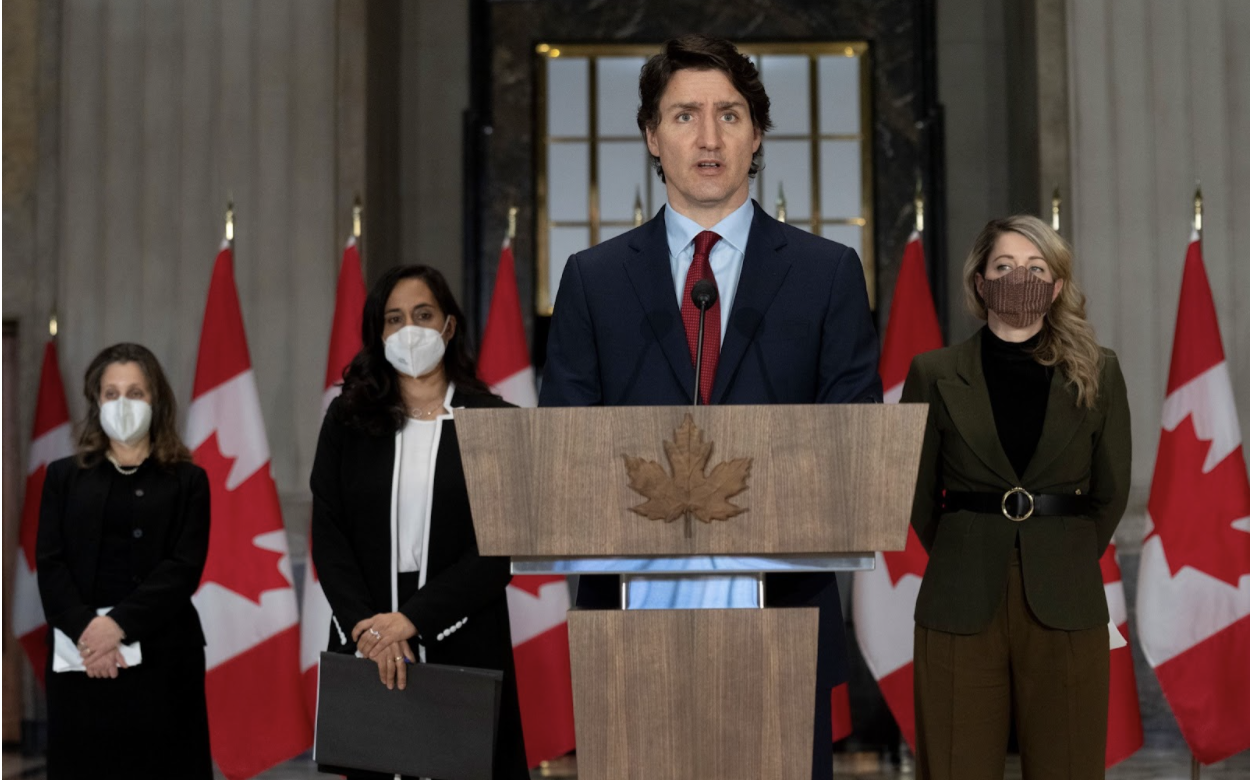Canada Commits to Unified Western Response against Russia
Prime Minister Justin Trudeau joins the Deputy Prime Minister, Defense Minister, and Foreign Affairs Minister in denouncing Russia’s invasion of Ukraine at a news conference on February 24th, 2022. Photo: Adrian Wyld / The Canadian Press
Canada, united alongside the United States’ and European Union’s response, launched a wave of sanctions targeting Russia’s economy in the aftermath of its invasion of Ukraine. The situation’s continual descent, however, has encouraged additional forceful measures to be taken by Canada’s leadership.
Canada’s course of action in the wake of Russia’s recognition of the Luhansk and Donetsk separatist regions of Ukraine tended to fall in line with other Western states. Denouncing Russia’s recognition of the Donbas separatist regions as “a flagrant violation of international law,” Prime Minister Justin Trudeau joined the U.S. and European allies in sanctioning Russia’s sovereign debt and banks, while deploying 460 more Canadian armed forces members to Latvia under the NATO mission Operation Reassurance.
These are not the first wave of sanctions that Canada has imposed on Russia — it enacted similar measures in the past in response to the 2014 invasion and annexation of Crimea. Unlike the Crimean crisis, however, Russia’s full-throated invasion of Ukraine on February 24th elicited a new, harsher stance from Canadian officials. Rather than simply targeting Russian individuals involved in the Ukrainian conflict, the North American nation revoked all export permits from Russia and restricted the assets of a wide array of Russian institutions.
Now, Trudeau’s administration aims to economically isolate Putin’s regime. On February 25th, the prime minister announced his support for cutting Russian banks from the SWIFT financial system, which would prevent Russia from receiving any cross-border financial transactions and cut the nation off from the global banking system. Trudeau was one of the first leaders of the G7 to push for this proposal, and within the week, western nations imposed a unified SWIFT ban against Russia.
Part of Trudeau’s coordinated appeal to the west for unified harsher Russian sanctions has to do with the limited economic ties that Canada and Russia share. Despite Canada’s harsh sanctions, both nations tend to export similar products such as oil and wheat, and there is insufficient overlap in trade for Canada to truly exact any damage against Russia by itself.
To address this issue, officials have sought alternative methods to punish Russia beyond economic pressure. Defense Minister Anita Anand announced additional shipments of 100 Canadian anti-tank weapons and 2,000 rockets will be sent to aid Ukrainian forces. On Tuesday, Canadian Foreign Affairs Minister Mélanie Joly revealed her intentions to petition the ICC to probe alleged Russian war crimes in Ukraine.

